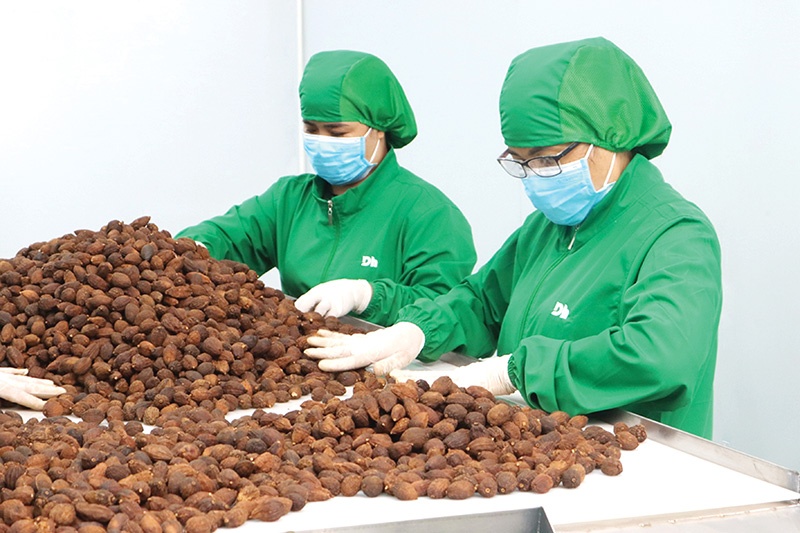Efforts in business climate redoubled
 |
| Vietnam has to extend efforts to rise in the rankings in terms of sustainable development and innovation, photo Le Toan |
Over the last few years, locally-owned Red Lotus Trading Co., Ltd. based in Hanoi has found it more favourable to do business thanks to the government’s increased administrative reforms, with hundreds of procedures having been either simplified or removed.
“The time it has taken us to implement import and export procedures has dropped by as much as 30 per cent, but we still have to pay lots of money and spend lots of time to conduct not only those procedures but also many others,” said the company’s vice director Tran Hai Van.
Like many other enterprises, Red Lotus Trading is now being tormented by some customs procedures. “We have completed all e-customs procedures as required, but we still have to submit many types of paper-based documents which need to be signed by the company’s leader,” Van said.
At last week’s government cabinet meeting, Prime Minister Pham Minh Chinh stressed the urgent need for continued reforms of administrative procedures as one of the prime conditions for the country to attract more investment and further spur confidence for individuals and businesses.
“There must be continued creation of favourable policies on tax and fees for enterprises to reduce input costs for production and business activities,” PM Chinh said. “Enterprises are now in massive difficulties and they need more simplified procedures and fiscal assistance.”
Top improvements
Over the past eight years of administrative reforms, Vietnam’s competitiveness in the global ranking indexes has remarkably improved, helping further strengthen confidence.
“Boosting administrative reform is one of the best solutions to enable the economy to reach wider interest from investors and enterprises and to improve its competitiveness,” Deputy Minister of Planning and Investment Tran Duy Dong said at last week’s government-led conference on heightening national competitiveness in 2022 via Resolution No.02/ND-CP, issued last month.
He elaborated that Vietnam has harvested significant achievements, such as innovation sitting at 44th out of 132 economies in 2021 (World Intellectual Property Organization); e-government standing at 86th place in 2020, up by two ranks in 2018 (UN); sustainable development at 51st out of 165 economies last year, up by 37 places compared to 2016 (UN); and cybersecurity in 25th place out of 194 economies in 2020, a rise of 25 places against 2018 (International Telecommunication Union).
“Last year saw nearly 160,000 enterprises newly established and resuming operations. Significant improvements in the quality of the business climate have been clearly demonstrated in general, though the levels of improvements vary among localities and sectors,” Dong said.
In one example, Electricity of Vietnam (EVN) has been beefing up reforms to improve access to electricity. At the government conference, Nguyen Quoc Dung, head of EVN’s Business Section, confirmed that the reform has benefited millions of people and saved a huge amount of costs.
“Use of the mobile money app replacing electricity bill collectors has liberated the labour of thousands of employees,” emphasised Dung.
EVN has provided cashless electricity bill payment services via a customer care app and website on the National Public Service Portal, collaborating with banks and intermediary organisations to provide more solutions thanks to partnerships with Viettel, VNPT, and MobiFone.
Besides this, Dung said that numerous technical solutions have been applied to improve the quality of electricity supply, including deploying means and technologies for hot manipulation of medium-voltage power grids; successfully fabricating and putting into use high-pressure, medium-voltage insulated sanitary ware with high-pressure water; applying construction technologies on live lines to reduce downtime; investing in power systems and power grids with backup, and much more.
“Application of technical solutions has significantly enhanced the electricity supply. The customer’s outage time has remarkably reduced by an average of 530 minutes per year, from over 4,000 minutes in 2013 to around 350 minutes in 2020,” the EVN representative said.
Meanwhile, a representative from Quang Ninh People’s Committee said that new policies have helped highlight the province as a good example of many reform initiatives, linking the improvement of the business environment with improving the quality of management and administration.
Ups and downs
The Provincial Competitiveness Index of Quang Ninh has been improved and maintained for eight consecutive years in terms of economic management, and was the outright leader between 2017 and 2020.
“In addition to measures on simplifying administrative procedures, developing infrastructure, and enhancing transparency, Quang Ninh has built a culture of accompanying investors and businesses and improving the efficiency of interaction between them and the government,” said a representative of the provincial People’s Committee.
Thanks to the effort of Vietnam’s government to retain a stable business climate, European business leaders have recently given optimistic and confident signals to the trade and investment environment. The Business Climate Index, a regular barometer of business sentiment among European companies operating in Vietnam, increased by 42 points to 61 points in January this year alone.
However, according to the Ministry of Planning and Investment, Vietnam’s administrative reforms have inevitably slowed down since 2020, making the country suffer from a decrease in some indexes, such as innovation down two places to 44th; sustainable development also down two places to 51st; asset ownership down six places to 84th; and corruption perception down eight places to 104th.
The MPI will conduct a study and come up with good proposals to attract capital investment from enterprises, particularly private enterprises, in major infrastructure projects.
According to Ousmane Dione, former country director for Vietnam of the World Bank, government reform programmes are going in the right direction. “If these reform programmes are sequenced and implemented effectively, they would open many positive opportunities for the country,” he said.
| Dang Tuyet Vinh-Representative European Chamber of Commerce in Vietnam
We recommend building a predictable and sustainable investment environment to achieve the vision of Vietnam’s government. In the pharmaceutical sector, we want to promptly solve current policy problems and reduce the burden on businesses by establishing a mechanism to maintain the validity of the certificate of circulation medicines for the life of the product instead of renewing every five years. There should be a harmonising of administrative requirements with international guidelines and practices, and eliminating admin requirements that are difficult to enforce as well as do not support the safety, quality, and effectiveness of products. Additionally, the way to reform institutions and simplify administrative procedures is digital transformation. We recommend building a clear regulatory framework, especially for the digital economy and tech-related businesses. Businesses and governments also need to apply new technologies and standards to be able to compete in the world market by accrediting electronic signature solutions to apply to cross-border agreements; deploying platforms and tools to improve traceability, the origin of goods, and transparency; free cross-border data exchange; and applying internationally-recognised technology security standards. | |
| Virginia G. Foote - Vice chair American Chamber of Commerce in Vietnam
Vietnam has done a very good job of maintaining the supply chain during these incredibly hard two years. In future growth, as all countries are competing for supply chains, a fair, transparent, and predictable regulatory environment that values innovation is the best avenue not only to attract new investment but also to maintain and grow the investment already here. Greater transparency and predictability in Vietnam’s tax system would strengthen the investment climate, particularly avoidance of retroactive rulings and assessments and what feels like overly aggressive audits. As we say, know your customer and go after the bad actors, but do not use it as a tool for unofficial payments. Also, the need for advance price agreements is important as supply chain inputs can cross multiple borders. This is a concept that Vietnam has embraced theoretically but needs to be implemented and provinces made aware of how to use it. We also encourage Vietnam to seek the conclusion and mutual ratification of a bilateral tax treaty with the US and to avoid double taxation of American citizens and investments in the interim. We urge the government to stabilise tax policies in the coming years to help businesses recover and grow sustainably. Now is not the time to increase or expand a tax on businesses. |
What the stars mean:
★ Poor ★ ★ Promising ★★★ Good ★★★★ Very good ★★★★★ Exceptional
Related Contents
Latest News
More News
- NAB Innovation Centre underscores Vietnam’s appeal for tech investment (January 30, 2026 | 11:16)
- Vietnam moves towards market-based fuel management with E10 rollout (January 30, 2026 | 11:10)
- Vietnam startup funding enters a period of capital reset (January 30, 2026 | 11:06)
- Vietnam strengthens public debt management with World Bank and IMF (January 30, 2026 | 11:00)
- PM inspects APEC 2027 project progress in An Giang province (January 29, 2026 | 09:00)
- Vietnam among the world’s top 15 trading nations (January 28, 2026 | 17:12)
- Vietnam accelerates preparations for arbitration centre linked to new financial hub (January 28, 2026 | 17:09)
- Vietnam's IPO market on recovery trajectory (January 28, 2026 | 17:04)
- Digital economy takes centre stage in Vietnam’s new growth model (January 28, 2026 | 11:43)
- EU Council president to visit Vietnam amid partnership upgrade (January 28, 2026 | 11:00)



 Tag:
Tag:




















 Mobile Version
Mobile Version